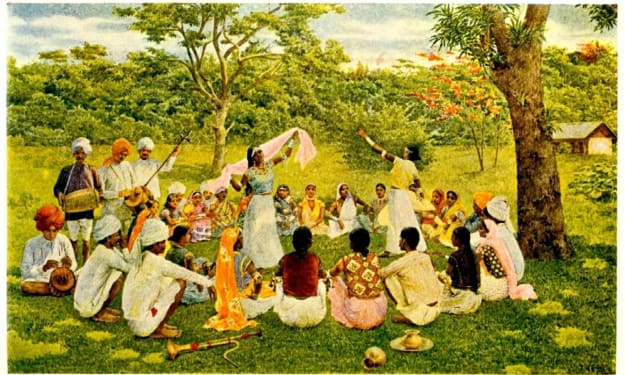The 'C' Word
Understanding the history of "coolies" has allowed us to reclaim the term in a positive way.

They made us hold the name coolielike a cutlass it bit us coming to Guyana
– From "Coolie" by Rajiv Mohabir
For as long as I can remember, the word "coolie" has been thrown around casually when referring to Indo-Caribbeans—even by Indo-Caribbeans themselves. It was only a few years ago I learned the actual meaning and history behind the word, and I was extremely surprised. I had never considered what the word really meant, or where it had come from. It was always used loosely around me, so I didn’t think it came from a negative place.
“Coolie” is largely believed to stem from the Tamil word kuli, meaning wages or hire. It was first used by Portguese captains and merchants working along the coast in India. It was later passed on to the British who used it to describe the men that worked for them. “Coolie” took on a different meaning as the era of indenture begin. It referred to someone who was paid to do menial work.
In fact, if you google the definition of coolie, it is defined as an unskilled native labourer in India, China, and some other Asian countries.
Following the abolition of slavery in the Caribbean in the 1830s, the British began looking for alternative workers to carry out the work on sugar cane plantations. Over the course of eight decades, they transported more than a million “coolies” to islands such as Trinidad, Jamaica, British Guiana, and Suriname. Most were deceived by recruiters in India who played on the vulnerable state of those looking to escape poverty or any other unpleasantries.
The title “coolie” was given to the journeyers regardless of their prior occupation or caste. The word left a sting as it was a constant reminder of the lowliness and hierarchy faced by labourers in their new land. Even as time went on, those who descended from “coolies” also inherited the title. By the late 1890s, the word took on different forms in the Caribbean vocabulary. It described someone exotic, someone different in essence—someone essentially foreign. It also remained an ethnic slur to remind Indians of their origins and challenges.
Despite this history, the word has been reclaimed as something people identify with in a positive manner. It’s likely that the movement began in the 1900s, as new generations of “coolies” were born native to the lands their great grand-parens immigrated to.
Often on Instagram I run into memes or comedy pages that use the word “coolie” when referring to the Indo-Caribbean community. This gives a sense of how far the language has progressed. We’ve broken the old stigmas, and can now connect to our community by way of one word. In 2019, “coolie” is something people are proud to be.
While at one point in time the word may have projected hurt, now feels like a reminder of a history that isn’t to be looked down upon. This understanding has helped me navigate when to use the word, and why I say it. I still find myself trying to avoid it at times, but I understand the who and why plays a role. I have no shame in my history, and I’m proud of who I am. I can make it a positive.
Guyanese poet Rajkumari Singh said:
"The word must not be left to die out, buried and forgotten in the past. It must be given a new lease on life."
And that’s exactly what we’ve done.
About the Creator
Tiara Jade
23. Toronto. Indo Caribbean.






Comments
There are no comments for this story
Be the first to respond and start the conversation.